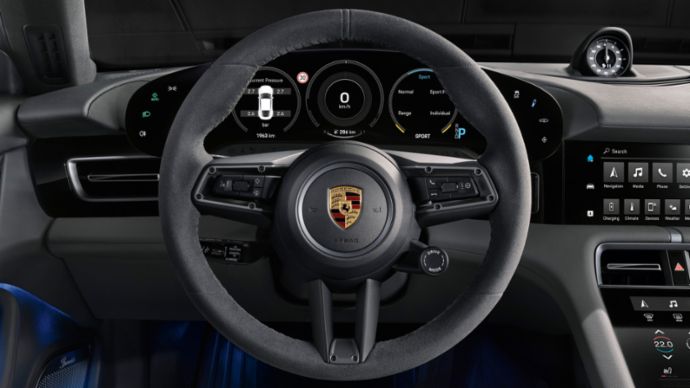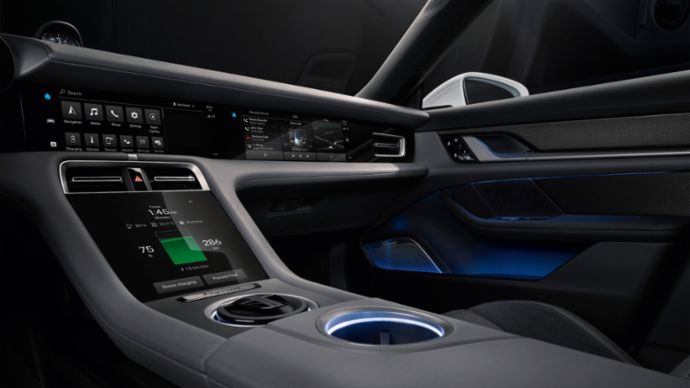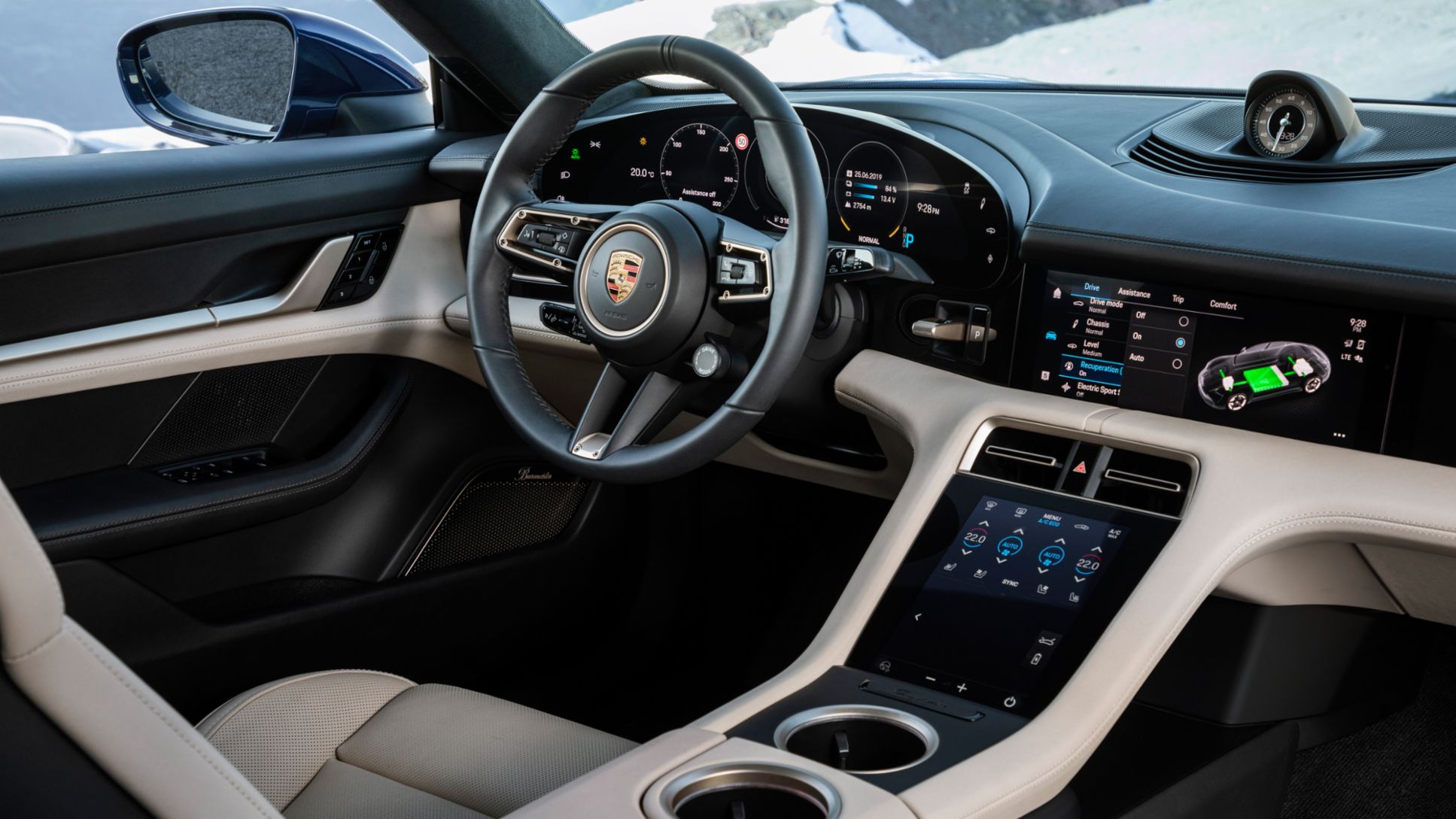It is clearly driver-focused. The instrument panel has a clean, minimalist and ultra-modern design, and operating the controls is quick and free from distractions. The free-standing, curved instrument cluster forms the highest point on the dashboard. It is clearly focused towards the driver and ensures that everything that is needed for driving is in view.
The innovative instrument cluster consists of a curved 16.8-inch screen with the rounded look that is typical of Porsche. A cowl has been comitted, which ensures a slim and modern appearance in the style of high-quality smartphones and tablets. Drivers can choose between four display modes for the instrument cluster:
-
The mode Power meter evokes the rounded instruments typical of Porsche. This display delivers information that is clearly arranged information, allowing for fast readability. A power meter replaces the rev counter in the middle instrument.
-
The Map mode replaces the central power meter with a map layout.
-
The Full Map mode intentionally omits the round instruments. In favour of a navigation map displayed across the full display.
-
The view “reduced” is limited to the essential driving information such as speed, road signs and navigation instructions using a minimised arrow.
There are also small, touch-control fields at the edges of the screen for operating the light and chassis functions. The instrument cluster is therefore wider than the steering wheel and reminiscent of the original 911.

The steering wheel has a light appearance and is available in two models: in addition to the basic version, which can be customised with coloured inserts as part of the accent package, Porsche also offers a GT sports steering wheel option. It has a distinctive design with visible screw heads and features a typical Porsche round mode switch which can be used to select the various driving modes.
The wing-shaped upper and lower sections of the dashboard stretch across the entire width of the car. A central 10.9-inch infotainment display and an optional passenger display are combined to form an integrated glass band in a black-panel look, thereby blending in visually with the interior.
All user interfaces have been completely redesigned
The number of classic hardware controls such as switches and buttons has been greatly reduced. Instead, control is intelligent and intuitive – using touch operation or the voice control function, which responds to the command “Hey Porsche”.
All vehicle configurations for the Taycan, such as Porsche Active Suspension Management (PASM), can easily be set up on the central screen via direct access. The driver can quickly access all apps via a clearly structured and customisable home screen. Apps include navigation, telephone, media, comfort and Porsche Connect. With optimised voice control, drivers can access the required function even faster. For the first time, front passengers in the Taycan have the option of their own touch display, allowing them to easily alter settings without distracting the driver.

The elevated centre console intensifies the feeling of a low seating position, as you would expect from a Porsche. It features a large 8.4-inch touch panel with haptic feedback. This allows the air-conditioning settings to be altered directly. Integrated handwriting recognition also allows quick address inputs.
Every detail has been reduced to the essentials. Like the Porsche 918 Spyder, the Taycan has a compact direction selector switch in the instrument panel instead of the classic selector lever. This gives the centre console a tidy look and creates storage space. A reduction to the essentials and a clear approach are also evident for the air vents. They have been fully modernised and can be operated intuitively. Traditional, mechanically operated louvres belong in the past, as airflows are now controlled both digitally and fully automatically (Virtual Airflow Control). By clicking the Climate menu, it is possible to switch between “Focused” for fast, directional cooling and “Diffused” for draught-free air conditioning. If the optional four-zone automatic climate control system (Advanced Climate Control) has been ordered, an additional 5.9-inch touch control panel with haptic feedback allows the system to be operated from the rear seats.
A wide range of customisation options and innovative material concepts
The Taycan’s colour and material design allows for individualised equipment, from traditional through to sustainable and modern. There is also the option of classic leather as well as the sustainably tanned Club Leather OLEA, which uses olive leaves in the tanning process. The natural quality of the leather is accentuated by a special cloud print. A new feature is the fully leather-free interior with state-of-the-art surface textures Race-Tex material is used. A high-quality microfibre material partially consisting of recycled polyester fibres. The floor covering uses the recycled fibre Econyl®, which is made in an innovative production process from items including recycled fishing nets.
The Taycan is available with a wide range of interior and exterior configurations, in both traditional and modern styles. Interior accents and trims underline the attention to detail, while meeting the highest quality standards typical of Porsche in terms of material characteristics and workmanship. Interior colours Black-Lime Beige, Blackberry, Atacama Beige and Meranti Brown are exclusively available for the Taycan. The optional interior accent package also gives customers a choice of special contrasting colour schemes Customers can choose from Black Matt, Dark Silver or Neodyme, an elegant champagne tone. The doors and centre consoles have trim made of wood, matt carbon, embossed aluminium or fabric.
In addition to the host of innovations, there is another detail that no Porsche should be without. As with the ignition lock on conventional Porsche models, the power button is located on the left behind the steering wheel.
Additional content
Sports cars, redesigned with sustainability in mind. The first all-electric sports car, the Taycan, marks the beginning of a new era for Porsche as the company systematically expands its product range in the field of e-mobility. An overview.


